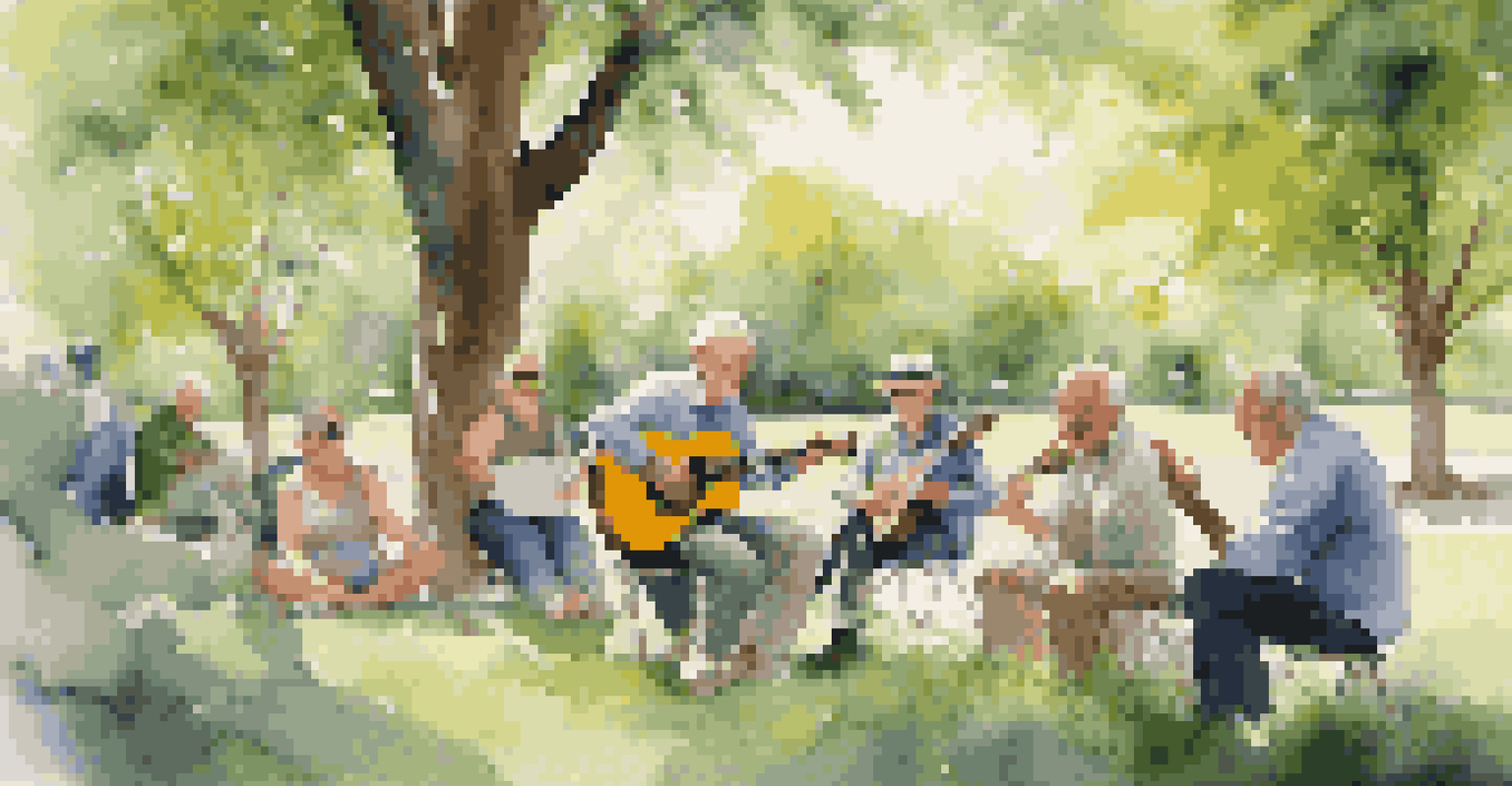The Role of Music in Enhancing Seniors' Cognitive Engagement

Understanding Cognitive Engagement in Seniors
Cognitive engagement refers to the mental processes involved in learning, memory, and problem-solving. For seniors, maintaining cognitive engagement is vital for their overall well-being. Activities that stimulate the brain, such as puzzles, reading, and yes, music, can help keep the mind sharp as we age.
Music can change the world because it can change people.
As we grow older, our cognitive functions may decline, leading to issues such as memory loss and difficulty concentrating. However, engaging the brain in enjoyable activities can delay or even prevent some of these challenges. Music, in particular, offers a unique way to stimulate cognitive functions without feeling like work.
By incorporating music into daily routines, seniors can enhance their cognitive engagement effortlessly. Whether it's listening to their favorite tunes or participating in music-based activities, the benefits can be significant.
The Science Behind Music and the Brain
Research has shown that music activates numerous areas of the brain, including those responsible for emotion, memory, and even motor skills. This widespread activation can lead to improved cognitive functions, making music an excellent tool for seniors. For instance, studies have found that listening to music can enhance memory recall and improve mood.

When seniors listen to music, it can trigger memories associated with specific songs, helping them connect with their past. This connection is not only nostalgic but also serves as a powerful cognitive stimulus. In essence, the melodies they cherish can act as a bridge to their memories, reinforcing brain activity.
Music Enhances Cognitive Engagement
Engaging with music can significantly stimulate cognitive functions in seniors, helping to maintain memory and focus.
Moreover, playing musical instruments or singing can further enhance cognitive engagement. These activities require coordination, focus, and memory, providing a comprehensive workout for the brain.
Music as a Tool for Memory Recall
One of the most fascinating aspects of music is its ability to aid memory recall. Many seniors report that listening to songs from their youth brings back vivid memories and emotions. This phenomenon is often referred to as the 'reminiscence bump,' where people tend to remember events from their adolescence and early adulthood more clearly.
The music we listen to, the songs we sing, and the lyrics we remember can serve as a powerful reminder of who we are and what we value.
In therapeutic settings, music is often used to help individuals with dementia or Alzheimer's disease. Familiar tunes can evoke memories and even spark conversations, providing a valuable connection to the past. This demonstrates how music serves as a powerful tool for not just engaging the mind, but also fostering social interaction.
By creating playlists of favorite songs or engaging in group sing-alongs, caregivers can enhance the cognitive experience for seniors, making memory recall a joyful activity.
The Emotional Benefits of Music for Seniors
Music is not just about cognitive stimulation; it also has profound emotional benefits. For seniors, listening to music can evoke feelings of happiness, nostalgia, and even calmness. These emotional responses can be particularly beneficial in combating feelings of loneliness or depression that sometimes accompany aging.
Engaging with music can also foster a sense of community. Whether it's participating in a choir, attending concerts, or simply sharing music with friends and family, these experiences can enhance emotional well-being. Music provides a universal language that can bridge gaps and strengthen connections.
Music Fosters Emotional Well-Being
Listening to and participating in music can evoke positive emotions, reducing feelings of loneliness and depression among seniors.
Ultimately, the emotional uplift that music provides contributes to a more fulfilling and enriched life for seniors, making it an essential element of their daily routines.
Music and Physical Activity: A Winning Combo
Incorporating music into physical activities can significantly enhance seniors' engagement levels. Whether it's dancing, walking to a rhythm, or participating in exercise classes set to music, the combination of movement and melody can make physical activity more enjoyable. This enjoyment can lead to increased participation and better physical health.
Research has shown that listening to upbeat music during exercise can improve performance and endurance. For seniors, this means they can enjoy the benefits of physical activity while having fun. Dancing, in particular, is a great way to improve coordination and balance, reducing the risk of falls.
By creating a lively environment with music, caregivers can encourage seniors to stay active, thus promoting both physical and cognitive health simultaneously.
Music as a Social Connector for Seniors
Music has the incredible ability to bring people together, fostering social connections that are vital for seniors. Participating in group music activities, such as singing or playing in a band, can create a sense of belonging and community. This social engagement is crucial for mental health, particularly in combating the feelings of isolation that many seniors face.
Community centers, assisted living facilities, and senior groups often organize musical events to encourage social interaction. These gatherings not only provide entertainment but also promote cognitive engagement through shared experiences. Music acts as a catalyst for conversation, laughter, and connection.
Social Connections Through Music
Music acts as a powerful social connector, bringing seniors together and fostering community through shared musical experiences.
By encouraging seniors to engage in music-related social activities, caregivers can play a pivotal role in enhancing their quality of life and mental well-being.
Practical Tips for Incorporating Music into Senior Care
Incorporating music into the daily lives of seniors doesn't have to be complicated. Simple actions, like creating personalized playlists or hosting regular sing-alongs, can make a big difference. Consider their musical preferences; music from their youth can often evoke the strongest responses.
Engaging seniors in music-related activities can also be an effective way to improve cognitive engagement. This could be anything from introducing them to new genres, encouraging them to play instruments, or even organizing music therapy sessions. Variety is key to keeping their interest piqued.

Additionally, consider utilizing technology to enhance the experience. Streaming services offer vast libraries of music, making it easy to find the perfect tracks for any mood or activity.